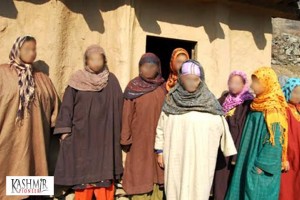SRINAGAR: Five young Kashmiri women have worked relentlessly for three years to comprehensively document one of the worst crimes against humanity committed by the Indian armed forces in the Valley: the mass rape of more than 30 women in Kunan-Poshpora villages of Kupwara in 1991.
The fruit of their labour, ‘Do You Remember Kunan-Poshpora’, was recently a topic of discussion at the Jaipur Literary Festival that concluded last week.
On February 23, 1991, an unspecified number of soldiers gang-raped the women, some of them old, during a search operation in Kunan and Poshpora villages.
In what has been termed as travesty of justice, a delegation led by a senior journalist, BG Verghese, which was sent to investigate into the incident, cleared the soldiers of the charges.
The State Human Rights Commission had recommended a compensation of Rs 2 lakh each to 34 victims and action against the officials who had closed the case in 1991.
In 2013, a group of 50 women, including the five authors, filed a fresh petition in the high court seeking reopening of the mass rape case.
The first chapter of the book, Kashmiri Women and Resilience, documents the story of the authors and their motivation for writing the book.
The chapter two, Sexual Violence and Impunity, written by Natsaha Manzoor, documents how the state has used rape as a weapon of war.
The third chapter, The Night in Kunan-Poshpora, written by Munaza Rashid, gives the details of the case.
The fourth chapter, Life in Kunan-Poshpora, throws light on how the rape survivors are living with the realities of life.
The fifth, Inquiries and Impunities, written by Samreen Mushtaq, talks about the cover-ups and distortions by the state, and the last chapter, People Who Remember, written by Ifra Bhat, comprises how a journalist, local residents and some other people remember the incident.
The last chapter, The Legal Battle, written by Essar Batool, is based on the legal history of the case.
The authors say Indian civil society’s selective outrage over incidents of rape in Kashmir and elsewhere was one of the main motives that led them to document Kunan-Poshpora mass rape.
“We saw how Indian civil society led high-octane protests against rape and murder of Nirbhaya in New Delhi in 2012 and how it maintained silence over the biggest rape of women in Kunan-Poshpora in Kashmir. A rape is a rape irrespective of the place where it is committed. Since there was no history of the Kunan-Pospora rape case, we decided to document it,” said Ifra Bhat.
The authors—three are social workers, one a student and the fifth a lawyer—said the hardest part was to convince their families about the endeavour.
“They said it is never a good idea to take up the cudgels with the state,” said Essar Batool.
“My sister told me once that I can become victim of the same crime if I persisted with it. But I was determined and today all of them are proud,” she added.
The book, published by Zubaan Publications, is set to be released in Srinagar on the 25th anniversary of Kunan-Poshpora mass rape on February 23.


